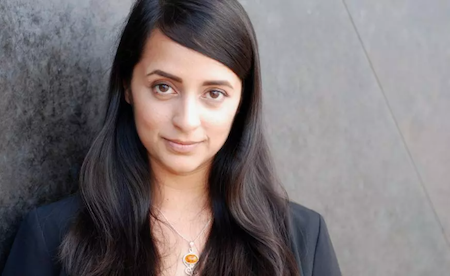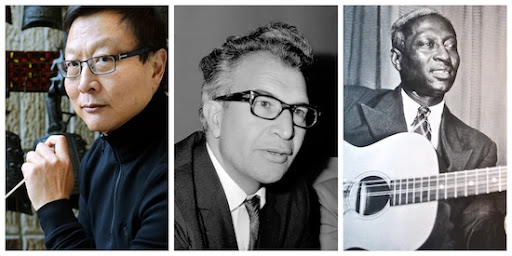by Jarrett Hoffman

. Today: Case Historic Performance Department at the Covenant, and Apollo’s Fire does Messiah
. Composers in the news: Reena Esmail (pictured), Julian Anderson, and Tania León
. Almanac: Bright Sheng, Lead Belly, Dave Brubeck, and the history of jazz at Oberlin
HAPPENING TODAY:
Today’s Tuesday Noon Organ Plus Concert from Church of the Covenant features the Case Historic Performance Department in music by Johann Gottfried Goldberg, Jean-Féry Rebel, and Handel — a composer who stands on his own at 7 tonight when Jeannette Sorrell and Apollo’s Fire present Messiah at Federated Church in Chagrin Falls. A freewill offering will be taken up at the Covenant, while tickets are available here for Apollo’s Fire.
Details in our Concert Listings.
COMPOSERS IN THE NEWS:
One name that has cropped up more and more on programs in the area in recent years is Indian American composer Reena Esmail. Composer-in-residence at the Los Angeles Master Chorale and Seattle Symphony, Esmail is also the artistic director of Shastra, an organization that promotes collaboration between the musical traditions of India and the West. Read a profile of her by Emily Wilson in San Francisco Classical Voice.
Another name to mention is British composer Julian Anderson, who was announced yesterday as the winner of the 2023 Grawemeyer Award for his Litanies for cello and orchestra, written in response to the fire at the Notre-Dame Cathedral in Paris. Read more here from Javier C. Hernández in The New York Times.
Joining Anderson as a recent recipient of a high-profile award is Tania León, who not only won the 2021 Pulitzer Prize but was also named a Kennedy Center honoree on Sunday. In an interview with NPR, she explains “how one fateful plane ride forced her to reimagine herself several times over, throughout a singular career.”
TODAY’S ALMANAC:
Turning 67 today is Chinese-born American composer Bright Sheng, who is known for incorporating elements of Eastern and Western music into his compositions. Along those lines, he’s named Béla Bartók among his greatest influences, given that composer’s imitation of folk melodies, and his harnessing of the flavor of folk music rather than necessarily its style.
Sheng’s works have twice been named first runner-up for the Pulitzer Prize — listen to one of those pieces, the orchestral work H’un (Lacerations), here in a recording by Gerard Schwarz and the Seattle Symphony.
Sharing that birthday is American composer and jazz pianist Dave Brubeck (1920-2012). Perhaps the most fitting way for us to honor that figure is by listening to Jazz at Oberlin, a live album by the Dave Brubeck Quartet recorded in Oberlin’s Finney Chapel in 1953. (Click here for a playlist of the album on YouTube.)
Not only considered among the best of Brubeck and among the best albums of the decade, it was also highly influential on the presentation of jazz — and on the prospect of official jazz studies at Oberlin, something that wasn’t at all in the picture in the ‘50s.
Wendell Logan, who in 1973 launched the College’s jazz department, described that Finney Chapel concert as “the watershed event that signaled the change of performance space for jazz from the nightclub to the concert hall.” (Read more about the history of the school’s jazz department here.)
Tracing backwards from jazz to blues, we come to American singer, songwriter, and twelve-string guitarist Huddie William Ledbetter, best known by the stage name Lead Belly, who died on this date in 1949. Both his own songs and his recordings of folk standards have been highly influential, and his 1940 sessions with RCA Victor resulted in the album The Midnight Special and Other Southern Prison Songs, considered a milestone in African American folk music. He was inducted into the Rock and Roll Hall of Fame in 1988.
Enjoy in particular his vibrant, expressive tenor and his improvisational bits of speech here in one of his most popular recordings: the folk song “Where Did You Sleep Last Night.”





